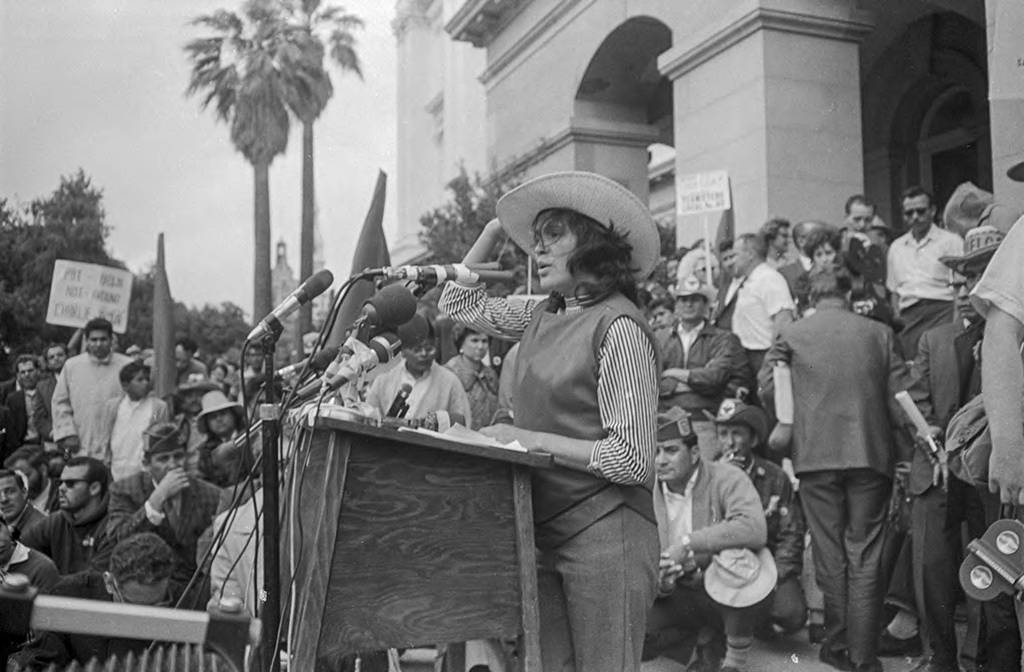Dolores Huerta
Dolores Huerta
Dolores Huerta (holding a megaphone) and picketers are next to grower Jack Pandol at a picket during the grape strike in Delano, ca 1966. Photo by John Kouns.
Dolores Huerta is one of the founders of the United Farm Workers (UFW). She was born in Dawson, New Mexico, in 1930, and moved with her mother to Stockton, California, when she was three. She started working as an activist in the 1950s, leading voter registration drives and teaching citizenship classes for the Stockton chapter of the Community Service Organization (CSO) where she soon distinguished herself as a motivated organizer and strong mediator.
Helen Chávez, Dolores Huerta, Kathy Lynch, and Jon Lewis picketing at a vineyard, Delano, ca. 1966. Photo by Emmon Clarke.
By 1959, Huerta was part of the small paid staff hired by Fred Ross and was sent as a lobbyist for the CSO in Sacramento where she was the only Mexican American woman lobbyist, pushing for issues such as disability insurance for farmworkers and against the abuses of the Bracero Program. After César Chávez left the position of national director of the CSO in 1962 to establish a new union, Huerta quit her job too to join forces with Chávez and Gilbert Padilla organizing the Farm Workers Association (FWA).
Dolores Huerta speaking to a crowd in front of the State Capitol, Sacramento, 1966
Dolores Huerta, vice president of the National Farm Workers Association (NFWA) and principal speaker of the rally, speaks to a crowd in front of State Capitol on the last day of the march from Delano to Sacramento. California Governor Pat Brown refused to meet with the marchers that day and instead spent the weekend in Palm Springs. “We are no longer interested in listening to the excuses the Governor has given in defense of the growers, to his apologies to them for not paying us decent wages or why the growers cannot dignify the workers as individuals with the right to place the price on their own labor through collective bargaining,” said Huerta according to the New York Times.
Dolores Huerta at CSUN, 1995
When, in 1964, she left Stockton and moved to Delano she was a 32 years old woman, mother of seven children, and in the middle of her second divorce. As historian Frank Bardacke wrote in his book Trampling Out the Vintage, Huerta’s only problem at this point was that “she didn’t have a wife like Helen,” referring to the fact that Cesar Chavez’s wife, Helen, was the one in charge of the children freeing up Cesar’s time to fully devote himself to the union. But once in Delano, Huerta found some support. Helen Chávez’s sister, Petra, took care of her youngest child, and her older daughter Laurie Head took responsibility for her younger siblings with the support also of other FWA volunteers.
Father Kenneth E. Irrgang and Dolores Huerta at the memorial march for Chávez, Delano, CA, 1993. Photo by John Kouns.
In the following years, she was responsible for some of the most important farmworker movement achievements. In 1966, following the Delano Strike, Huerta negotiated the contract with the Schenley Wine Company. This was a historical accomplishment because, for the first time, agribusiness recognized the farmworkers union. By 1971 the union, by then known as the United Farm Workers (UFW) had won more contracts and Huerta was named vice president. In the late 1960s and early 1970s, Huerta worked as the East Coast director of the table-grape boycott for New York City, mobilizing other unions, community workers, religious groups, consumers, and others to join the cause, an effort that brought the table-grape growers of California to the bargaining table.
Tom & Ethel Bradley Center
California State University, Northridge
18111 Nordhoff Street, Northridge, CA 91330
Phone: (818) 677-1200 / Contact Us


